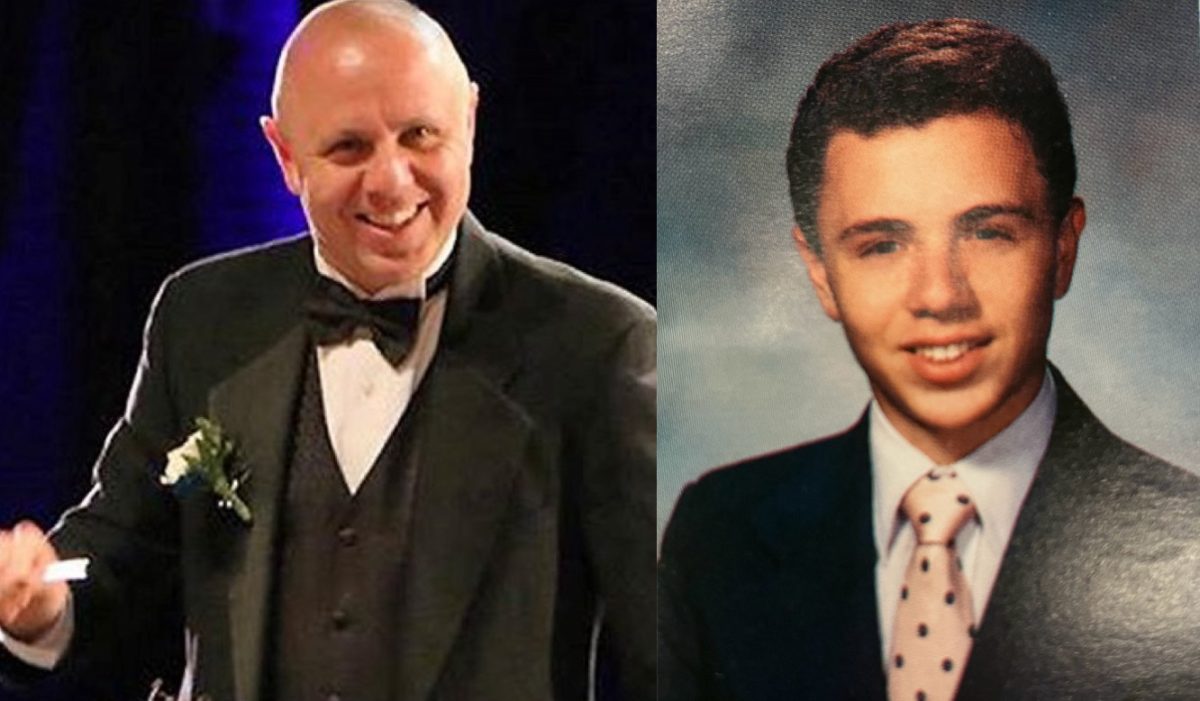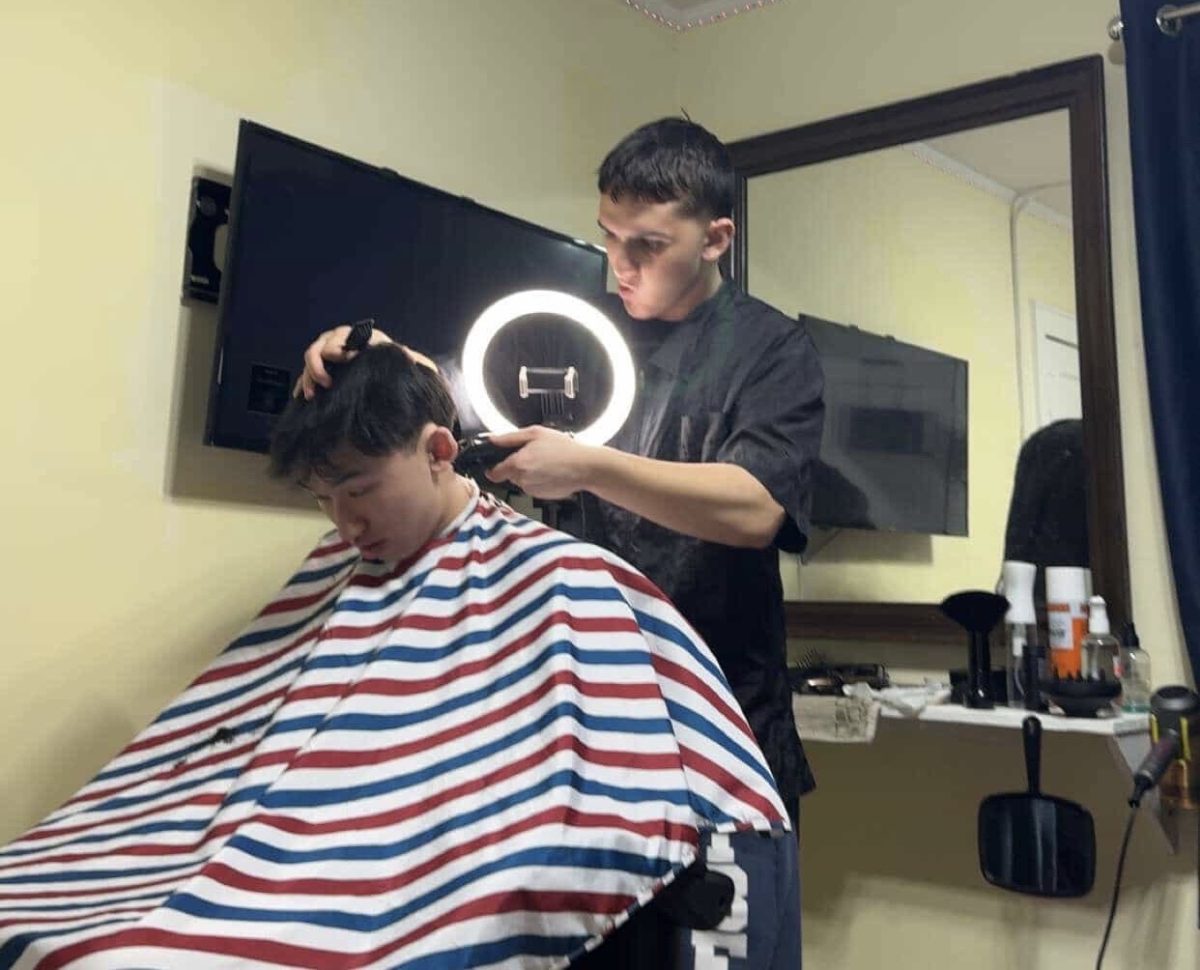You occasionally may see him wandering the halls of South High, or you may have fond memories of band or orchestra class from middle school. As a 1989 graduate of South High, he proudly finds himself back at home—at the middle school. Now Long Island Music and Entertainment Hall of Fame’s 2023 Educator of Note, Mr. Alan Schwartz serves as the South Middle music department chairperson but is otherwise known as the bald piano guy.
Oliva Gu: When did you attend South High School? What was your most memorable moment?
Alan Schwartz: I’m a proud South High Rebel, Class of 1989, attending from 1985-1989.
Unofficially, my most memorable moments were watching this amazing basketball player for the Rebels, named Chris Gitz, totally dominate on the court. I was a senior, and I think he was a junior. Officially, my most memorable moment was the first time being allowed to go to the mirror building and being off campus during school hours. I kind of felt like an adult [in] that moment.
OG: Was there a particular teacher that influenced the person you are today?
AS: The teacher who influenced me the most was actually my eighth-grade health teacher at South Middle, Mr. Sulinski (yes, Coach Sulinski’s dad). I’ve been trying for 30 years to recreate the atmosphere of his classroom in Room 834 [in] my band room.
OG: How did you find your way back to South?
AS: I went to Queens College, so I never was more than six miles away from Great Neck. I still went to all the Theatre South productions and music concerts, just to see my friends from the younger grades as they grew older. I also was the pianist for some of the middle school shows. When the South Middle music department was looking to hire a teaching assistant, they asked me. I took the job and got extremely lucky. Within two years, a full-time music teaching position at South Middle opened up, and I got the job. I was extremely lucky to be in the right place at the right time.
My Class of ’89 graduation tassel still hangs over my desk in the music office at South Middle. As cringy as this sounds, if I’m ever walking through the high school, through the foreign language/social studies hall in the lower 400s, I’ll always gently tap my old locker (4572). I know it’s stupid, but tapping my old locker sometimes helps me to remember the person I was, and how awkward and insecure I was, even if it’s for a split second.
OG: During your time at South, what shows did you do? Did you have a favorite?
AS: No favorites, but I either musically directed or served as accompanist for around 40 of them, including mostly productions from South Middle. Early on in my career, I played the piano for the Theatre South shows (including writing incidental music for some of them), played the piano for several of the operas, and musically directed a few productions at North Middle too. I was the Vice President of Theatre South in my senior year and was in three musicals at South, including West Side Story and Pippin. Playing the part of Puck in A Midsummer Night’s Dream was my favorite theatrical experience, making my entrance by swinging from a rope from the balcony onto the stage. I also appeared as a singer in the operas for all four years at South, but would sneak down in costume to the orchestra pit to play French horn with the orchestra whenever I wasn’t on stage. As it was way back then, the South High opera still is one of the greatest musical opportunities that Great Neck has to offer, and Dr. Robinson and Mr. Michael Schwartz continue to uphold its brilliance.
OG: Throughout high school, did you know that you wanted to continue music in your life? How did you decide on music education? S
AS: My parents were both music teachers—chorus teachers. Music was the first thing I remember, and it played a major role in my daily life. I was one of those high school and college students [who] really didn’t know what to do with my life until I eventually was asked to be the Music Teaching Assistant between South Middle and South High. It took my first day in September 1995, to realize that this was what I was meant to be doing.
OG: How many years have you been teaching? Has there ever been a moment where you catch yourself saying something that your teachers used to say to you?
AS: Mr. Schwartz laughs. For 29 years, I’ve been catching myself saying the things I swore I’d never say that teachers always said. “You’ll understand when you’re older, you don’t know the value of money, put on the jacket, what’s wrong with you…” All that stuff I’d roll my eyes at, I say as if it’s nothing now.
OG: Mentioning the locker memorabilia, how do you aim to achieve this? Aside from Mr. Sulinski, how do you navigate the challenges of middle school music education?
AS: I like to think of what the first music director of Sesame Street said: “We are not dealing with children. We are dealing with a very short audience.” In other words, young people are still people, and therefore, teaching must be as collaborative as possible. Students will always know when you’re being condescending and patronizing Band/Orchestra/Chorus/Theater, etc. are the perfect classes to teach collaboration skills.
OG: The COVID-19 pandemic was unlike anything for teachers, especially in music. What was the year like for you, and what changes have been made in your teaching since then?
AS: I truly hated every second of teaching during that pandemic. I am convinced that teaching is best face-to-face. Screens only form a filter between people. Yes, information and collaboration can happen, but the atmosphere of learning can be seriously jeopardized. After COVID, I found myself teaching with slightly less technology, opting for the silence of listening. Mr. Rogers once said, “I’m very concerned that our society is much more interested in information than wonder.” After using so much technology during the pandemic, I thought so much more about what Mr. Rogers said, and he’s so on the ball. We don’t give the “gift of silence” too much anymore, and it’s a very noisy world.
OG: As the founder of “Friday in the Front,” how did you come up with the idea? Was there any inspiration?
AS: Every summer when I was a kid, my parents and I would go to Boston for a three-day weekend. I loved Faneuil Hall, not just for the history but for the street performers and musicians there. You never knew what act there was going to be. One hour it could be a juggler, another could be a jazz clarinetist, another could be a magician, another could be a classical cellist. I just loved that as they were performing, there was a hustle and bustle going by. Loud conversations, hundreds of them talking constantly in all different directions. Some would watch the performers for a bit, some barely noticed. These performers were just putting a little art to the beautiful chaos of a busy marketplace. It was so casual. Back in New York, Penn Station was like that too, with their musicians as well. Friday in the Front seeks to capture that informal feeling. It gives the performer an opportunity to face a crowd, and in turn, it gives a listener a chance to take in a “concert” without the pressures of be[ing] forced to stay quiet. Every Friday in the Front is different, but one thing that must remain constant in each of them is a casual feeling, that no one is being coerced to stop what they’re doing to listen.
OG: Recently, you have been named 2023 Educator of Note and in 2017, you were named Educator of Excellence. Has it been a full-circle moment?
AS: Not sure about full circle, but there’s no question that I feel proud. I didn’t get into teaching to get awards and accolades. I really got into teaching to learn how to be the best version of myself. And to be rewarded for being comfortable with who I am is the most gratifying feeling.







